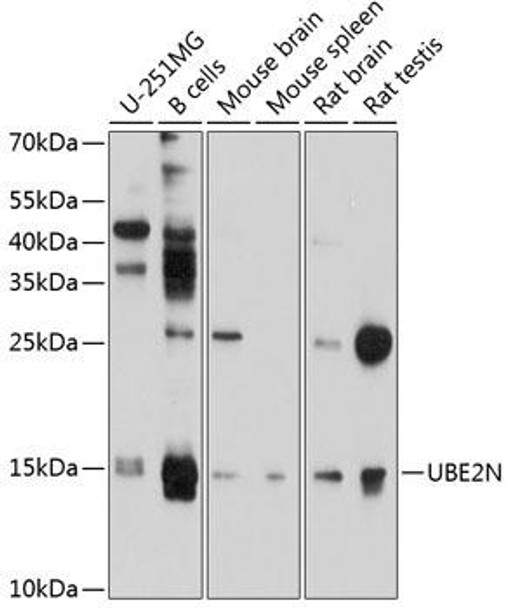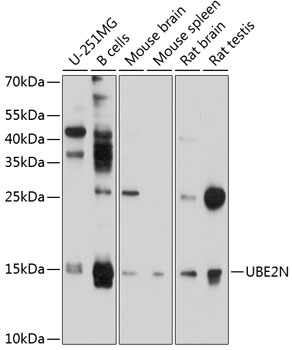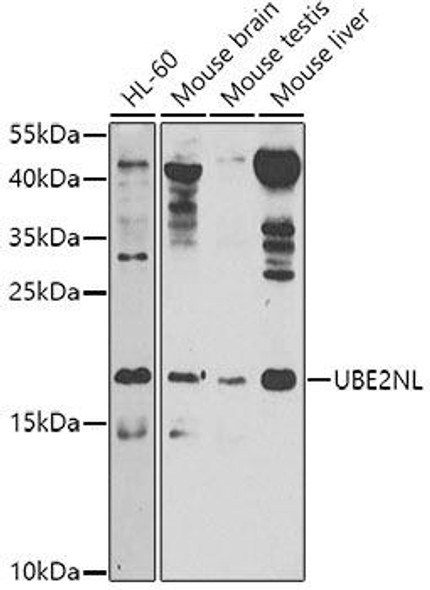| Background: | The modification of proteins with ubiquitin is an important cellular mechanism for targeting abnormal or short-lived proteins for degradation. Ubiquitination involves at least three classes of enzymes: ubiquitin-activating enzymes, or E1s, ubiquitin-conjugating enzymes, or E2s, and ubiquitin-protein ligases, or E3s. This gene encodes a member of the E2 ubiquitin-conjugating enzyme family. Studies in mouse suggest that this protein plays a role in DNA postreplication repair. |
| UniProt Protein Function: | The UBE2V1-UBE2N and UBE2V2-UBE2N heterodimers catalyze the synthesis of non-canonical 'Lys-63'-linked polyubiquitin chains. This type of polyubiquitination does not lead to protein degradation by the proteasome. Mediates transcriptional activation of target genes. Plays a role in the control of progress through the cell cycle and differentiation. Plays a role in the error-free DNA repair pathway and contributes to the survival of cells after DNA damage. Acts together with the E3 ligases, HLTF and SHPRH, in the 'Lys-63'-linked poly-ubiquitination of PCNA upon genotoxic stress, which is required for DNA repair. Appears to act together with E3 ligase RNF5 in the 'Lys-63'-linked polyubiquitination of JKAMP thereby regulating JKAMP function by decreasing its association with components of the proteasome and ERAD. Promotes TRIM5 capsid-specific restriction activity and the UBE2V1-UBE2N heterodimer acts in concert with TRIM5 to generate 'Lys-63'-linked polyubiquitin chains which activate the MAP3K7/TAK1 complex which in turn results in the induction and expression of NF-kappa-B and MAPK-responsive inflammatory genes. |
| NCBI Summary: | The modification of proteins with ubiquitin is an important cellular mechanism for targeting abnormal or short-lived proteins for degradation. Ubiquitination involves at least three classes of enzymes: ubiquitin-activating enzymes, or E1s, ubiquitin-conjugating enzymes, or E2s, and ubiquitin-protein ligases, or E3s. This gene encodes a member of the E2 ubiquitin-conjugating enzyme family. Studies in mouse suggest that this protein plays a role in DNA postreplication repair. [provided by RefSeq, Jul 2008] |
| UniProt Code: | P61088 |
| NCBI GenInfo Identifier: | 46577660 |
| NCBI Gene ID: | 7334 |
| NCBI Accession: | P61088.1 |
| UniProt Secondary Accession: | P61088,Q16781, Q53Y81, |
| UniProt Related Accession: | P61088 |
| Molecular Weight: | 17kDa |
| NCBI Full Name: | Ubiquitin-conjugating enzyme E2 N |
| NCBI Synonym Full Names: | ubiquitin conjugating enzyme E2 N |
| NCBI Official Symbol: | UBE2N |
| NCBI Official Synonym Symbols: | UBC13; UbcH13; HEL-S-71; UbcH-ben; UBCHBEN; UBC13 |
| NCBI Protein Information: | ubiquitin-conjugating enzyme E2 N |
| UniProt Protein Name: | Ubiquitin-conjugating enzyme E2 N |
| UniProt Synonym Protein Names: | Bendless-like ubiquitin-conjugating enzyme; E2 ubiquitin-conjugating enzyme N; Ubc13; UbcH13; Ubiquitin carrier protein N; Ubiquitin-protein ligase N |
| Protein Family: | Ubiquitin-conjugating enzyme |
| UniProt Gene Name: | UBE2N |







